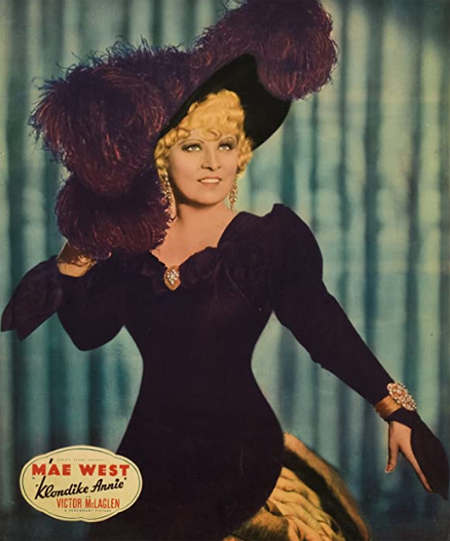
“GOIN’
TO TOWN†(1935;
Directed by Alexander Hall)
“KLONDIKE
ANNIE†(1936;
Directed by Raoul Walsh)
“GO
WEST, YOUNG MAN†(1936;
Directed by Henry Hathaway)
“EVERY
DAY’S A HOLIDAY†(1937;
Directed by A. Edward Sutherland)
“MY
LITTLE CHICKADEE†(1940;
Directed by Edward F. Cline)
(Kino
Lorber)
“GOODNESS
HAD NOTHING TO DO WITH IT—THE MAE WEST FILMS, PART TWOâ€
By
Raymond Benson
This
is the continuation of reviews of the classic 1930s (and 1940) films of Mae
West, which began here.
Kino
Lorber has just released in gorgeously restored, high-definition presentations
every Mae West film made between 1932-1940—the Paramount years, plus one with
Universal. This review will cover the last five of nine titles.
What
is not commonly appreciated among Hollywood enthusiasts is that Mae West held a
unique position in the history of cinema. Until the modern era, she had the
extraordinary fortune—for her time—of being a leading actress who wrote her
own screenplays. Six of the nine pictures reviewed here and in Part One were
written by West, one was co-written, and all but the first was based on or
adapted from West’s plays or stories. It wasn’t until the likes of Tina Fey,
Kristen Wiig, Angelina Jolie, and a finite number of other actresses appeared
on the scene to write original scripts for themselves that Hollywood allotted
that kind of opportunity to a female performer. West was doing it in the 1930s,
and this was unprecedented. Her talent and wit deserve a renewed appreciation
today.
Her
first two solo pictures (not counting her debut, Night After Night) are
undoubtedly the quintessential Mae West movies (She Done Him Wrong and I’m
No Angel) because of the freedom she had in the pre-Code years. Once the
Production Code kicked in on July 1, 1934, West battled censorship and the
challenges of getting across her risqué humor with more subtlety. It can be
said that her remaining Paramount Pictures titles suffered when compared to the
pre-Code fare, but they are still entertaining and worth a look.
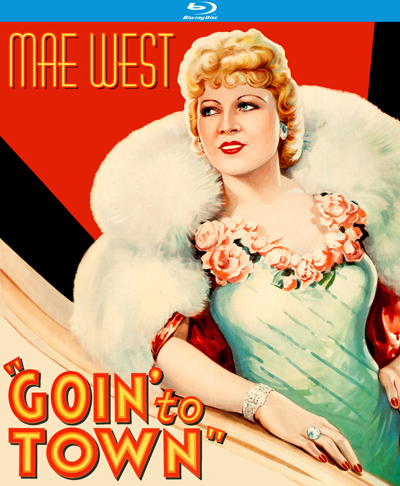
Goin’
to Town (1935)
takes place at the turn of the century when automobiles are appearing but there
are still horses and buggies. It’s a globe-hopping affair that begins in what
appears to be the Wild West as Cleo Borden (West) is a cattle rancher who
juggles men on the way to fulfill her desire to refine her manners and join
high society. Although her designs are really aimed at British engineer Edward
Carrington (Paul Cavanaugh), she marries
Fletcher Colton (Monroe Owsley) for convenience, but he’s an obsessive gambler.
In Buenos Aires, Cleo faces off with rival Grace Brittony (Marjorie Gateson).
As a recurring theme to this and other West vehicles, the actress sings “He’s a
Bad, Bad Man, but He’s Good Enough for Meâ€! Goin’ to Town is
entertaining enough—it’s better than the previous Belle of the Nineties,
but the picture lacks interesting co-stars for West. The Blu-ray comes with an
audio commentary by film historian Kat Ellinger, plus the theatrical trailer.
Click here to order from Amazon
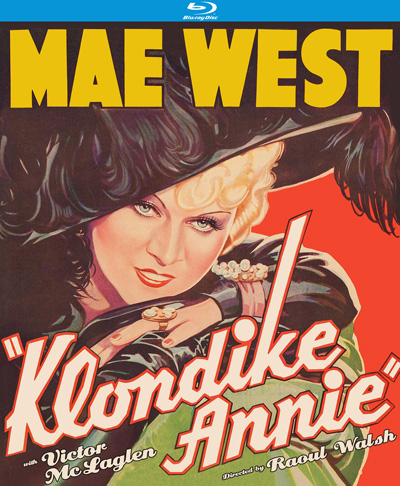
Klondike
Annie (1936)
is overseen by solid filmmaker Raoul Walsh, and it shows. It is perhaps the
best of West’s post-Code pictures, despite its embarrassingly offensive take on
Asian characters, which was standard operating procedure in Hollywood for the
time. It’s the 1890s again (why do so many of West’s films take place in that
decade?). Rose Carlton (West) is a “kept woman†in San Francisco’s Chinatown by
cruel club owner Chan Lo (Harold Huber, not an Asian actor). Rose ends up
killing Lo and escapes on a ship to Alaska, the captain of which is Bull Brackett
(the fabulous Victor McLaglen). Rose disguises herself and impersonates the
deceased Sister Annie Alden, a missionary who was on her way to Nome to head up
the only establishment of worship in an otherwise rough Gold Rush town. Bull
falls hard for “Annie,†and she likes him, too, but she also has eyes for
Mountie-like inspector Jack Forrest (Phillip Reed), who is looking for Rose
because she’s now wanted for murder. Klondike Annie went through major
Hays Office interference and in fact two major scenes were deleted from the
film—the murder of Lo (we now only hear about what happened in conversation
later), and the sequence in which Rose dons Annie’s clothing and dresses the
former sister in the garb of a streetwalker (the censors seriously objected to
this on puritanical grounds!). Nevertheless, Klondike is lively, rather
suspenseful, and features the most exotic of settings for a Mae West movie. The
disk comes with an audio commentary by film historians Alexandra
Heller-Nicholas and Josh Nelson, plus the theatrical trailer.
Click here to order from Amazon
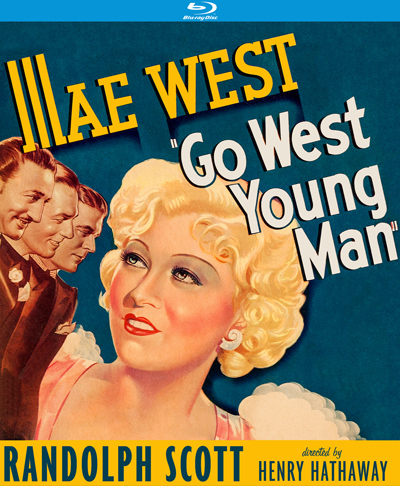
Go
West, Young Man (also
1936) was helmed by accomplished director Henry Hathaway, and it fares well for
West and her filmography. West is controversial movie star Mavis Arden, who has
a penchant to get in trouble. Thus, her studio has assigned press agent Morgan
(Warren William, who was known as the “king of pre-Code,†but he was apparently
still working post-Code) to keep an eye on Mavis and stop her from dalliances
with men. On the way to a public appearance, their car breaks down in a hick
town where Mavis and Morgan must stay at a boarding house run by a prudish
woman (Alice Brady) and her more open-minded aunt (Elizabeth Patterson). The
problem is that hunky Bud Norton (Randolph Scott) runs the gas station next
door to the boarding house! It’s another enjoyable West romp that is more of a
screwball comedy than any of her other pictures. The disk comes with an audio
commentary by author/film historian Lee Gambin, plus the theatrical trailer.
Click here to order from Amazon
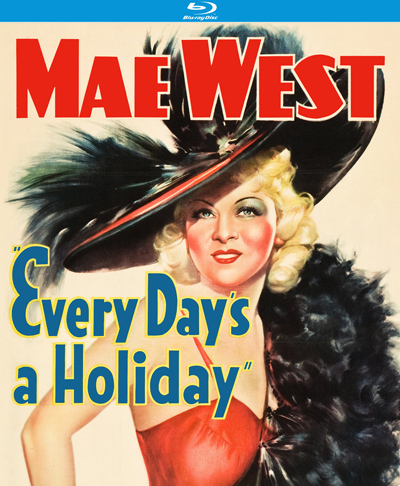
Every
Day’s a Holiday (1937)
was the last picture West made for Paramount, after which her contract was
cancelled. She, along with many other actresses such as Katharine Hepburn,
Marlene Dietrich, and even Bette Davis, were deemed at the time by the
Hollywood press as “box office poison†(which was nonsense, of course). It’s
too bad, for Holiday is one of the funnier titles in the West canon,
mainly due to character actor co-stars Charles Butterworth (as Graves, a butler
who is sweet on West’s character, Peaches O’Day), Charles Winninger (as Van
Doon, an outrageous millionaire who also has the hots for Peaches), and
bumbling Walter Catlett (as Nifty, Peaches’ manager). Peaches, who has a habit
of “selling†the Brooklyn Bridge to numbskulls, has her eyes on police
captain McCarey (Edmund Lowe), whose rival is the police chief Quade (Lloyd
Nolan). Peaches, wanted by the law, “disguises†herself by donning a black
wig—and of course no one recognizes her as Peaches anymore (!). Quade, once pursuing
Peaches to arrest her, is now after “Fifi†to woo her. Fun stuff all around. Look
for Louis Armstrong’s cameo leading a marching band and performing a song. The
disk comes with an audio commentary by film historian Kat Ellinger, plus the
theatrical trailer.
Click here to order from Amazon

My
Little Chickadee (1940)
is the unique one-time collaboration West made with W. C. Fields. It was produced
by Universal Pictures, Fields’ studio at the time, and directed by his favored
craftsman, Edward F. Cline. Ever since the movie was made, the Hollywood
scuttlebutt claimed that West and Fields couldn’t stand each other and that it
was a troubled production. West was also miffed at the studio for giving Fields
co-writing credit for the script, which apparently West had written alone
(Fields had written just a couple of his solo scenes). Contemporary criticism
was not favorable to the picture, even though it was a box office hit. However,
this reviewer finds My Little Chickadee to be very funny and
enjoyable, and it’s mainly due to Fields. He seems to be on a roll here, while
West is undoubtedly more subdued. Taking place in the Wild West, Flower Belle
Lee (West) has fallen for the Masked Bandit, who robs stagecoaches. She is
suspected of cavorting with him by town gossip Mrs. Gideon (the marvelous Margaret
Hamilton) so Flower Belle must leave. While on the train, she meets Cuthbert J.
Twillie (Fields), who appears to have a lot of money. To deboard in the next
town, Flower Belle must be married, so she convinces Twillie to marry her,
which he is more than happy to do (but it’s a sham wedding with a fake preacher
played by Donald Meek). In the meantime, she continues her dalliance with the
Masked Bandit, who in real life is the town’s saloon owner, Jeff Badger (Joseph
Calleia). There are some belly-laugh sequences, including one in which a goat
wanders into Flower Belle’s hotel room, and Twillie, in the dark, attempts to
consummate the marriage by getting in bed with the goat! The disk comes with an
audio commentary by film historians Alexandra Heller-Nicholas and Josh Nelson.
Click here to order from Amazon
After
Chickadee, Mae West made only one more picture in the Golden Age (The
Heat’s On for Columbia in 1943) and then concentrated on theatre and
nightclub appearances for the next couple of decades until she returned to the
screen in a small part in the disaster, Myra Breckenridge (1970), and
then in her own, final film, Sextette (1978). It’s too bad she was more
or less booted out of Hollywood in the early 1940s—probably because she was
deemed too old or not as popular as she once was. That said, there is no doubt
that Mae West had a huge impact on Hollywood comedy in the 1930s, and she was
one of the strongest and most influential female performers in Tinsel Town’s
history.
Pick
up the new Kino Lorber Mae West series (all titles available separately) and
find out for yourself!
*
Cinema
Retro’s
ranking of the nine Kino Lorber Mae West titles in order of preference—
1. She Done Him Wrong (1933) 2. I’m No Angel (1933) 3. Klondike Annie (1936) 4. My Little Chickadee (1940) 5. Every Day’s a Holiday
(1937) 6. Go West, Young Man (1936) 7. Goin’ to Town (1935) 8. Night After Night (1932) 9. Belle of the Nineties
(1934)